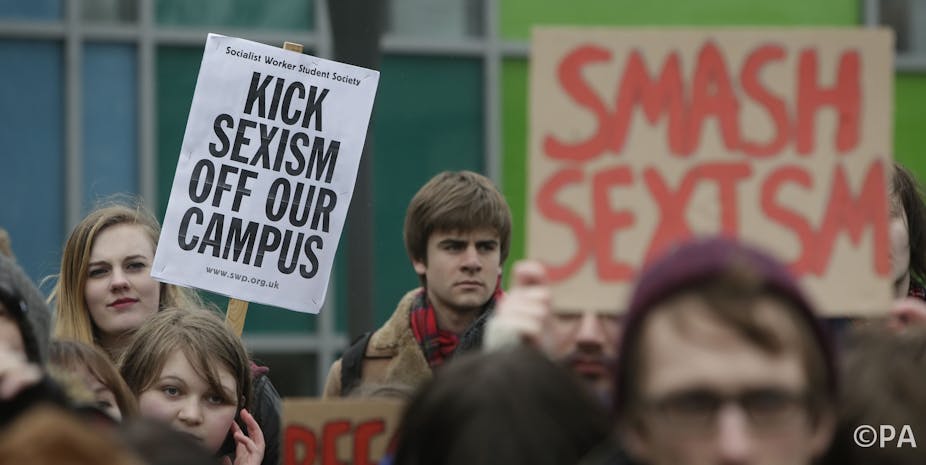The world media cognoscenti have been on a crusade recently against a particular brand of misogyny. And their campaign has achieved some results. Controversial comedian Daniel O’Reilly just announced that he is retiring his “Dapper Laughs” character after footage emerged of him on stage describing a woman in the audience as “gagging for a rape”. This incident sparked an online petition signed by 60,000 people calling on ITV2 to decommission his show – which the channel subsequently did – and his UK tour was also cancelled.
Campaigners are hoping a similar fate will befall Julien Blanc, the US “pick up artist” whose seminars teach men to coerce women into sex. Blanc’s Australian tour was cut short after his visa was revoked in the wake of protests – an online petition is now urging the Home Office to deny him entry to the UK.
Censorship?
The furore in both these cases has prompted cries of censorship and accusations that the “chattering classes” are using their political clout against working-class culture. The first gripe is based on a basic misunderstanding of free speech. O’Reilly and Blanc have the right to hold forth in any space which will have them, but their opponents are also entitled to voice opinions, and TV companies and other organisations are allowed to decide not to give them a pulpit. This hardly makes them Mary Whitehouse.
But there’s no doubt that attempts to deny people like this a platform allow them to describe themselves as victims of “political correctness gone mad”. This bolsters their support and makes them appear much more credible than they actually are. Of course, it would be infinitely preferable if nobody watched Dapper Laughs or attended Blanc’s seminars in the first place – and we need to ask why they do.
Both defenders of and detractors from contemporary laddism have claimed that it is inherently proletarian. This is a facile and classist interpretation of sexist behaviour – and it not only feeds reactionary caricatures of the privileged woman who swoons at a joke, it also lets middle-class men off scot free.
The class war
This is not a “culture clash” between the cultivated and the puerile classes – the class war is at work in representations of working-class men as crass, crude and more misogynistic than the rest. The fight against sexism has been caught up in other social and political antagonisms, like the viral catcalling video in the US that edited out the white guys.
Blanc’s “boot camps” cost almost $3,000 – a price certainly not attainable for those in lower-paying jobs. “Lad culture” at universities is often the preserve of those at the top of the heap – rugby lads, members of elite drinking societies and debate teams.
This type of laddism can probably trace its lineage to Oxford’s notorious Bullingdon Club, recently immortalised in film in The Riot Club. The Bullingdon’s membership has boasted David Cameron, Boris Johnson and other famous toffs. At their informal gatherings women have been made to whinny on all fours while men brandish hunting horns and whips.

Hitting back
The Bullingdon and Dapper Laughs lads are all part of a broad cultural misogyny which currently has enormous power. It is connected to recent economic and social trends – recession, competition for jobs and resources and a backlash against increased gender equality. People have wondered why the “new sexism” is particularly attractive to the young – it’s partly because social media provides it with a nourishing pit of primordial ooze, but it’s also because young people of all genders are coming of age in the jaws of a competitive, individualistic neoliberalism.
There’s a reason why, alongside the rape joke, the most ubiquitous slogan of contemporary laddism is “make me a sandwich”. It’s a constant tussle out there, and one that women are believed to be winning. This means that some men feel the need to put them back in their place.
Gross sexism isn’t the only way to do that – women also face an ideology of “intensive motherhood” which makes us feel guilty if we can’t be “all in, all the time”, a “New Victorianism” which reclaims domesticity as the route to self-fulfilment, a bombardment of “brain science” arguing that men and women are indeed essentially different, and renewed threats to reproductive rights.
So the problem is much bigger than Dapper Laughs and Julien Blanc. Removing their platform to speak will not tackle it – we need to ask why people are listening and laughing in the first place. We all need to work together to create the kind of society in which the abuse of women is not hilarious. There are more positive models of masculinity out there, which should be supported and nurtured more widely. Otherwise we will soon be petitioning against another Dapper Laughs – because people still think he’s funny.

